Win-Win Racial Disengagement
Joseph Kay, American Renaissance, January 10, 2020
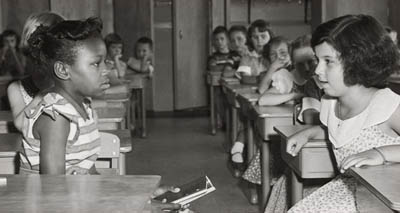
In the struggle to turn blacks into whites, we have used increasingly draconian measures. Unfortunately, this attempt at racial alchemy has failed, and there is little prospect of success.
The time has come to end this experiment, just as we ended Prohibition. This is not a call for restoring Jim Crow-like legally required segregation. Rather, it is an acknowledgement that neither blacks nor whites want forced assimilation. Left to their own inclinations, both groups would stay out of each other’s way. Let us live and let live, and not impose the values of one group (whites) on those (blacks) who reject them.
This disengagement can and must be a win-win and appeal to economic interests. Both blacks and whites would be freed from totalitarian measures devoted to objectives that have proven impossible.
As for the likelihood of success, consider the remarkable evolution of gay rights. The idea of gay marriage once seemed absurd. Today it is mainstream. Progress on disengagement will be incremental, starting at the fringe and slowly becoming orthodox wisdom, but it can happen.
What gives optimism is that both blacks and whites are tired of today’s social engineering. The most formidable enemies of realistic solutions are relatively few: energetic white egalitarians in universities, the mass media, and government — not the public.
Progress requires that toxic social engineering be exposed and debated. Voters will reject it just as they reject “affirmative action.” Conceivably, in a decade, there will be no more talk of spending billions to close intractable race-related gaps, just as schemes to uplift humanity by banning alcohol have almost vanished.
The advantages
First, disengagement enjoys an enormous advantage: Nature has hardwired humans for separatism, not assimilation. Surrounding oneself with diversity is not an evolutionary strategy for survival. In the long run, it is radical egalitarians, not we, who fight the uphill battle. Only their superior social position and fanaticism keeps assimilation going.
Left to their free will, people sharing common characteristics, whether racial or religious, prefer to be among themselves. Separatism need not be legally imposed apartheid; it will occur naturally, though there will be many voluntary exceptions.
Since the ethnic enclave is the default option of human nature, the federal government must spend billions and hire thousands of bureaucrats to coerce whites to associate with blacks in housing and schools. The meager results testify to the unnatural character of this project.
Second, blacks overwhelmingly choose electoral politics as the mechanism for advancement, not self-help, and the structure of US politics puts a premium on geographical clustering. Given their reliance on government, blacks demand black public officials, which is rational because these officials advance black interests. This quest requires blacks dominating a geographical area, so they can vote for black representatives and also hire black teachers, principals, social workers, and other public employees.
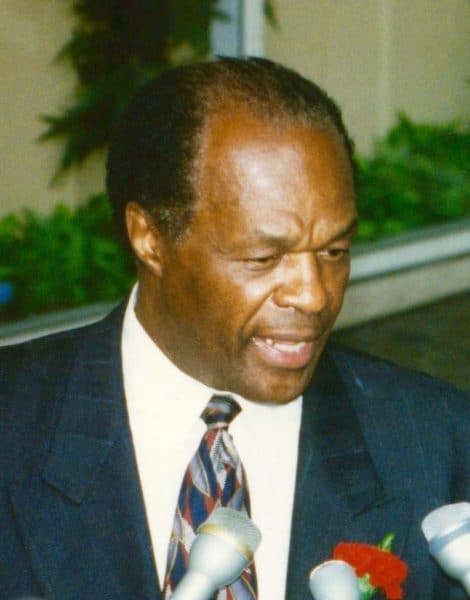
Marion Barry: The black choice for mayor of Washington, D.C. (Credit Image: Elvert Barnes / Wikimedia)
Policies that scatter blacks are antithetical to black interests, since a few blacks here and there cannot elect the black officials who bestow jobs and entitlements. Black leaders similarly depend on population density, since they owe their positions to bloc voting. Reliance on government explains opposition to gentrification. An influx of upscale whites attacks the foundation of black political power: the geographically based voting bloc.
Distinctive consumer tastes, which would be difficult to satisfy in heterogeneous neighborhoods, reinforce politically driven clustering. These tastes need more than a store or two. Fitting enterprises include black-centered beauty products, African clothing, hair salons and barbershops, churches, dance and music venues, food vendors, pay-day-loan and check-cashing businesses, and related services ubiquitous in every black neighborhood.
Blacks are more interested in personal consumption than utopian abstractions, and this is true across the socioeconomic spectrum. African-Americans have the opposite perspective of Islamic extremists who forego worldly pleasures on the path to totalitarian theocracy. US foreign policy would be immensely more successful if the Taliban could be enticed to end violence in Afghanistan by the promise of big-screen TVs, the latest SUVs, stylish clothing, and everything else that mesmerizes American blacks. Black politics is an endless clamor for handouts, despite the rhetoric of equal rights and opportunities. Legal equality is the pathway to materialism.
There are always new fashions, the latest electronic gadgets, and countless other ways to spend money for short-term pleasure. The upshot is that since appetites are insatiable and consumption cannot be self-sustaining — due to lack of savings or creation of wealth-generating businesses — nearly all blacks rely on government generosity.
Blacks also tolerate sub-standard public services provided that they are black run. Dangerous, mismanaged schools in Baltimore and Detroit survive because the financial beneficiaries are themselves black. This is the public administration corollary of indifference to black-on-black crime.
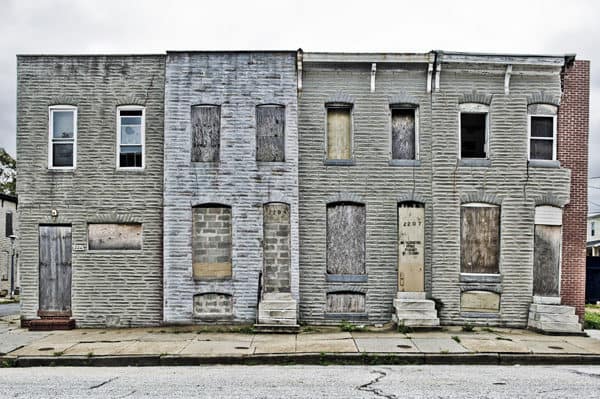
Dilapidated row-homes in Baltimore (Credit Image: © Edwin Remsberg / VW Pics via ZUMA Wire)
Blacks are often willing to sell out their own people for economic gain. Why else would the politically ambitious endorse anti-law enforcement measures that will devastate black neighborhoods? Are the low educational standards championed by many black leaders the pathway to academic achievement? Black leaders endorse open borders — which hurt blacks — for financial gain and because they are a requirement for being a Democrat. Being a good “race man” need not have anything to do with actually helping blacks. There is no need to sell policies to most blacks based on wonkish cost-benefit calculations. High-sounding rhetoric, plus the endorsement of prominent fellow blacks is enough to make the sale.
How are we to address anger over economic inequality? Can we produce thousands more black doctors and CEOs? Are quotas and even more draconian affirmative action necessary? Fortunately, the problem is not as formidable as it might appear. Among blacks, there is little stigma in holding a well-paid no-work job with a high-sounding title. Think of Deans of Diversity and Inclusion who issue pointless, unread reports. This mentality is also behind new names for buildings and eliminating anything conveying “whiteness.” In cities with a large black population, for example, crime-ridden high schools have gone from plain-Jane Benjamin Franklin HS to “The High School for Engineering and Science” or “Malcolm X School for Social Justice” as if this cosmetic change could transform a disaster into a “good school.” This fondness for symbolism is a wonderful gift for making race-related progress on the cheap.
What about the pathologies associated with blacks? Racial disengagement means avoiding them since nearly all are intra-racial and, even more important, fixing them is seldom a black priority. Most of the time, “fixing them” is more about hiring more black fixers than actually curing the problem. Such pathologies are, moreover, far more aggravating for white middle class do-gooders than the alleged victims. Blacks don’t want whites counseling them to reduce out-of-wedlock births, save money to invest in a home, get off the dole, avoid petty thievery, abstain from alcohol and drugs, speak standard English and all the rest of the white-middle class elixirs.
Yes, interracial crime in nearly all black-on-white, but largely disorganized and curable by better policing, stiffer incarceration or other proven solutions. Physical separation would make it much less common.
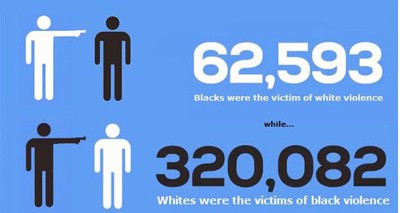
Disengagement would also be revenue neutral. There would be no need for a race-based Manhattan Project or Marshall Plan. There might even be some modest savings, but the big benefits will come from escaping the burden of failed social engineering: for example, letting universities escape the dumbing down that comes with accommodating diversity. Particularly beneficial will be ending totalitarian creep as one solution after the next fails. At worst, disengagement would mean billions “wasted” in Detroit and Baltimore, but we now waste billions in foreign aid for sub-Sahara Africa. As Voltaire said, the perfect is the enemy of the good, and this holds true for race relations.
Marketing disengagement
Let’s begin with certain political realities. First, whites cannot unilaterally impose racial disengagement no matter how mutually beneficial. Anything that hints of Jim Crow, if advocated by whites, is DOA. It’s not the ideas advocated by whites that hurt blacks; it’s their source, even if it is whites who come up with the best ones. Solutions, regardless of parentage, must be championed by blacks themselves. Nor does it make much difference is these ideas are actually inimical to black interest or appear looney; even crazy ideas, such as teaching Ebonics, can be useful.
The vocabulary of disengagement should stress phrases such as “black autonomy,” “cultural independence” and “self-determination.” The underlying argument is that blacks are different from whites and prefer to be more African than American and have an innate right to live according to a culture that will be different from the one that whites impose on themselves. Nothing in American law or our traditions demands cultural uniformity. The key word is “different,” not better or worse.
This vocabulary has the advantage of not being anti-white. There is nothing anti-white about demanding black self-governance, provided whites don’t have to live under black rule. Separation was also part of the vocabulary of many American religious sects, such as the Mormons, Amish, Hasidic Jews, and even of the Pilgrims fleeing England.

Bergholz, Ohio – An Amish girl gets help with her arithmetic lesson at their schoolhouse. (Credit Image: © Michael Francis McElroy/zReportage/ZUMA)
Nor need there be any claim that blacks ruling blacks will “improve” black life according to “white” standards. Disengagement rejects such wonkish white-concocted nostrums as charter schools to boost black test scores. Letting blacks educate black children in ways that blacks deem best says nothing about bringing them up to “white” standards. There is no reason blacks should judge themselves according to “colonial” standards. It is the embrace of a distinctive blackness that underlies today’s call for defunding the police. This does not reject enforcing rules per se but instead only demands a policy that would let blacks be black in their own communities.
Africanization of life for millions of African-Americans would not be coerced. Blacks who prefer to send their children to traditional white schools would be free to do so and, no doubt, many would. The parents, however, must understand that this “white” environment requires accepting white standards. A black child in a “white” school must act “white” and satisfy white requirements. And if this is unacceptable, blacks would be free to move to a more culturally attuned, black-run school. Free choice makes everything different from Jim Crow.
The future?
Ending coerced racial engagement is not revolutionary. This is how the United States functioned for decades before egalitarianism. The aim is restoration, not the next step in human progress, and thus disengagement is reactionary, not radical.
What is to be done? Consider the options in higher education. There are already 101 historically black colleges and universities. We need only allocate additional resources to make them more attractive to blacks.
Major investments can also be made in health care. Better funded black-community-based medicine would not only better serve African-American clientele; the experience of treating people of color would expand expertise. Black doctors and nurses could specialize in conditions particularly afflicting blacks, a benefit since people of color often believe white doctors misunderstand them. There could be African-themed alternative medicine, even if practitioners lack conventional MD qualifications.
Meanwhile, just as President Trump proposed in his Platinum Plan, hundreds of billions could be invested in black communities. The only way to keep this money from being completely wasted would be to put black entrepreneurs under the wing of white companies. A black software firm might work with Microsoft, and thus not only would the black-owned firm prosper, Microsoft will be freed of costly but futile affirmative action. The black-owned firm might help Microsoft develop a version of Word integrating black English.
The ripple effect to this community-based investment might encourage blacks to return to cities once deemed unlivable. The professionals hired by black-owned companies will surely need housing, restaurants and similar amenities (including black-run K-12 schools), and these can be provided by fellow blacks. There could be black-dominated neighborhoods filled with African-style markets and their dozens of small stalls, each with an owner/proprietor instead of “foreign” white-owned chains, such as Walmart.
America’s long history of localism would facilitate racial clustering. Disengagement is like other forms of separation: wet and dry towns and different laws on gambling, prostitution, pornography, public nudity, building codes, housing density, keeping animals, the commercial/residential mix, and so on.
A strong case can be made that racial disengagement is already close at hand. An African-American unhappy in lily-white Princeton, New Jersey, with its white over-policing and lack of retail catering to black tastes, can relocate 12 miles to Trenton, New Jersey, which is nearly half black and offers a “blacker” environment.
The aim of disengagement is merely to help people relocate.
Why this can happen
The prognosis for disengagement is good because it is so widely desired, especially among black intellectuals who reject racial alchemy. Perhaps deep down they realize they can never be white, despite ostensible success in the white world.
The largest opposition comes from white radicals who see black demands for so-called justice as the leading edge of their transformation of US society. These racial egalitarians will struggle to prevail over black intellectuals who reject their assigned role.
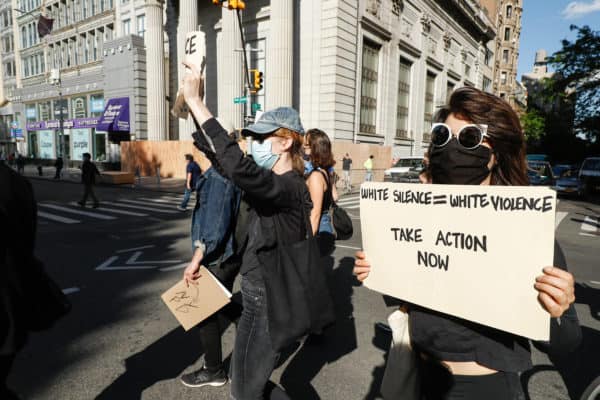
June 1, 2020, New York. (Credit Image: © John Lamparski / SOPA Images via ZUMA Wire)
This reality has enormous consequences politically: There is no need for whites to mobilize politically to impose racial separation; blacks will do it for them. The white role is to facilitate this exodus by paying the necessary bills. This is likely to be revenue neutral — a dollar spent building up black businesses and institutions is a dollar not wasted on “diversity.”
This process may take a decade or two. However, in the long run, opposition to human nature is futile. Racial disengagement will return.
















